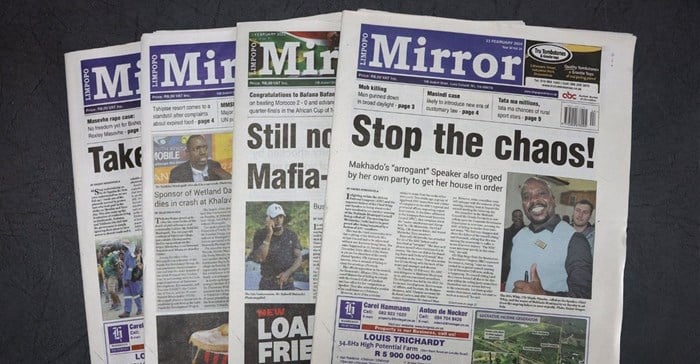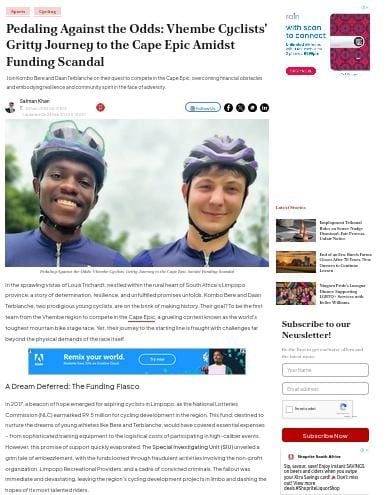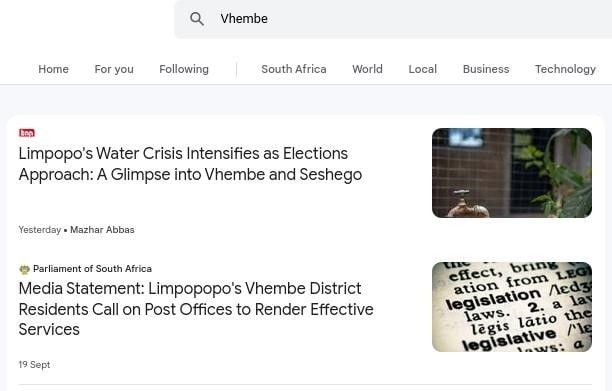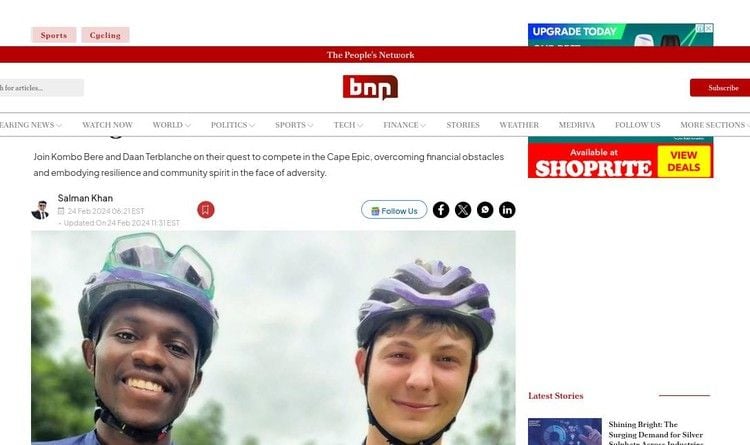This week the Competition Commission is probing how online news is affected by AI chatbots, search and advertising technology. The outcome of the hearings is important for the future of news reporting in South Africa. In this article we try to explain why local news publishers are under threat.

The Limpopo Mirror is published in Louis Trichardt, a town in the north of South Africa’s Limpopo province. Photo: Anton van Zyl
1. Why most genuine news publications are battling to make ends meet
Only a few decades ago, if you wanted to read the news, someone in your household paid for a newspaper. Running a printed newspaper, with journalists who went out daily to report stories, was a sustainable business. There were four main revenue sources: subscriptions, sales of individual copies, adverts and classifieds. The main barrier to entry was the cost of printing. Subscriptions and sales of individual copies were usually meant to cover this, but the real money was advertising - and for some publications, like the Cape Argus in Cape Town, the classifieds.

The advertisers sponsored the news, whether in a national daily, or a small weekly newspaper distributed in a rural town. The big chain stores placed their ads in the big dailies, and the mom-and-pop stores advertised in the local papers. In towns this income paid for the reporter to attend the monthly council meeting, cover school events and visit the court to find out who might have ended up on the wrong side of the law.
Take for example the Limpopo Mirror, a weekly newspaper published in Louis Trichardt which one of us, Anton, owns. In the early 2000s, the cover price was R2. We’d typically sell just over 8,000 copies. The cost of printing was roughly 15% to 20% of our turnover. That has gone up to 30% and 35%. The ad loading (the percentage of space devoted to advertising as opposed to news) was between 50% and 60%. This has dropped to below 30% and some weeks we don’t even get to 20%.
This means there is less money to pay for journalists, sub-editors, layout artists and sales staff. The decline in advertising results in fewer pages in the newspaper, and less space for news articles.As the web became increasingly popular, newspapers began publishing their stories online, usually free. Limpopo Mirror was one of the first newspapers in the country to publish a website with weekly news updates. That was way back in 1997, some months before Google was born. In the beginning most of us were driven by experimentation and the rush to be early adopters so we didn’t lose out to the competition. But there was no viable business model.
Adverts were rare and it took a while before this became the main way people read their news.Over time more and more people switched to reading their news online. It was convenient, immediate and usually free, especially as the price of data dropped. At the same time, purchases of printed newspapers began to decline.
A few examples: In 2006 the Sunday Times was the biggest weekend newspaper in South Africa, with an audited circulation of just over half a million copies. In the last quarter of 2023, it was still the top-selling weekend newspaper in the country, but with a dismal circulation of just over 62,000. This included more than 11,000 digital copies. The Daily Sun was once the biggest selling daily, and in the last quarter of 2007 boasted a circulation of over 513,000 copies. Last year it dropped to below 13,000 sold copies and changed its distribution method. This has been the trend for most long-running newspapers on the planet.In Limpopo, many of the local newspapers closed shop. In the bigger centres, such as Polokwane, the independent publishers have been bought out by the bigger publishing groups.
These once-proud independent titles have been turned into freesheets, or “shoppas” as they’re better known in the US markets. This is a common strategy pursued by the bigger publishing groups, especially those who own the newspaper presses. In the “knock-and-drop” model, the paper is distributed to all households in an area - an attractive prospect for advertisers. As a result, the model works well in the fight for “inserts”, those leaflets bundled into the newspaper, advertising anything from groceries to spare parts and furniture. Very often these newspapers are turned into four or eight page “jackets”, merely there to keep all the leaflets together.
In large urban areas the freesheet model works fairly well and major publishers such as Caxton use very sophisticated and thorough distribution methods to ensure that almost every house in the more affluent suburbs gets a copy of the weekly newspaper. In many cases the editorial content is also respectable.But the freesheet model does not work well in informal settlements or rural areas. To effectively reach readers in these areas, it’s too costly to deliver door-to-door. So bulk drops of newspapers have to be dropped off at shopping centres, for example, and wastage of these is high. This means you have to print larger quantities to reach the same number of people and this is not economically viable. In the past five years, printing and distribution costs have skyrocketed.
To produce a newspaper has become extremely expensive, which means advertising tariffs have had to increase.In the past two decades there have also been dramatic changes in the way buyers and sellers find each other. First to go was the classified sections of newspapers. It was simply much cheaper and more effective to use sites such as Gumtree, Junkmail or BOB (Bid-or-Buy). Next to go were the property sections. Several big players, such as Property24 and Privateproperty, started to dominate the property marketing sector. Then the second-hand motoring sector found another haven with sites such as Autotrader, Cars24 and other startups.
While this was all happening, newspapers such as the Limpopo Mirror tried to keep up. Although print circulation dropped to around the 4,000 mark, the readers did not move away. On the contrary, readership increased, but many readers moved online. The challenge was to turn that readership into a revenue model that would pay for quality journalism.In South Africa, unlike some other parts of the globe, there is not a culture of paying for news. Subscription models provided some solutions in Europe, but here it is currently not a viable option. So revenue for most publishers has spiralled downward.
Many printed newspapers have closed: Sunday Independent, Pretoria News, Sunday Sun, Noseweek and Weekend Post to name a few. Many are just barely hanging on. To do so they often have to cut staff including sub-editors and photographers, or pay appallingly low freelance rates.
One hears a cacophony of derisive comments about how bad journalism has become. We think this is greatly exaggerated; changes in technology have actually helped journalists access information more easily and produce better analyses of data. Moreover social media keeps journalists on their toes. Though there is no data to prove this, it seems to us that mistakes are spotted more quickly, and unethical behaviour pounced on with greater vigour nowadays.The low cost of entry has also allowed new types of news publications to start, like GroundUp, which Nathan edits. In South Africa there’s also AmaBhungane, Bhekisisa, Spotlight and Health-e.
These would have been much harder to run in the age of print. But they are all non-profit organisations, primarily funded by large institutional donors. They do not depend on selling their product to survive and the limit to how many such organisations can exist has possibly been reached. So why is advertising not working for news publications? Advertising revenue has been destroyed mostly by Google Ads and social media adverts. Many of the local businesses that used to advertise in the Limpopo Mirror now prefer boosting posts on Facebook, for example.
As online news took off, Google cornered the online advertising market. In the 1990s, corporate marketing managers would negotiate with newspapers, be it directly or via an advertising agency. Now they mostly advertise using Google Ads. This means two things for online news publications. First, we compete for advertising revenue with others who publish Google Ads. Those could be fitness apps, blogs, gaming sites, gambling sites, porn sites, aggregated news sites, or fake news sites simply offering rewrites of our stories using ChatGPT.
Second, Google Ads pays very badly. On average, an online news publication can expect to earn R60 to R80 per 1,000 views of a page running a Google Ad. This is simply unsustainable.This week the Competition Commission is holding an inquiry on how online news is affected by AI chatbots, search and advertising technology “to determine if there are any market features that may be adversely affecting competition … and to … remedy the features that we find” according to the inquiry’s chairperson James Hodge.
Given that Alphabet (owner of Google), as well as Meta (owner of Facebook, Instagram and WhatsApp), and X (Twitter), are multinational companies not easily beholden to South African lawmakers, it’s a tough ask.
2. How parasitic websites hurt genuine news publications - with Google’s help
BNN is a news publisher. Here’s how they describe themselves: “Our commitment is to deliver honest, fact-based, and unbiased international reporting that can be trusted. We strive to help citizens address the issues that matter most in their lives. We are the trailblazers, the guardians, and the truth-seekers.”
Their news stories consistently rank highly on Google News searches. Here’s a screenshot of the first part of a recent one, published on 24 February, by someone named Salman Khan:
The intro is flowery: “In the sprawling vistas of Louis Trichardt, nestled within the rural heart of South Africa’s Limpopo province, a story of determination, resilience, and unfulfilled promises unfolds. Kombo Bere and Daan Terblanche, two prodigious young cyclists, are on the brink of making history.”Many of BNN’s stories start with a similar over-the-top style.This story, like most of BNN’s stories, is plagiarised. It is a rewrite of a story written by one of us, Anton, jointly published by GroundUp and the Limpopo Mirror on 22 February.Also, it appears that the BNN story has been rewritten by ChatGPT.
Here’s our first paragraph:“In Louis Trichardt, two young cyclists are training to compete in what is arguably the world’s toughest mountain bike stage race, the annual Cape Epic. They aim to make history as the first team from rural Vhembe to compete alongside the world’s best mountain bike riders. Their biggest challenge, however, is to find sponsorship to cover the cost of travelling to Cape Town: something that would not have been necessary if funds allocated for cycling development in Limpopo had not been looted.”You’ll note that our style is much plainer - intentionally so.
Days after Anton’s story was published we both searched “Vhembe” (the region where Anton reports from) on Google News. The BNN version of the story consistently appeared near the top of the search results. The genuine version didn’t.This is but one example. Often BNN news stories, plagiarised and seemingly rewritten by ChatGPT or some other AI chatbot, appear higher in Google search than their genuine counterparts. These stories also include the made-up facts that AI chatbots frequently add.
For example, a recent BNN story states: “The provincial government, in a landmark decision, has announced plans to purchase 18 private hospitals. At the heart of this ambitious initiative stands Professor Alex van den Heever, guiding the strategy to bridge healthcare disparities and bring about a transformative upliftment in public health services.”
Except that van den Heever, far from having anything to do with guiding the initiative, unequivocally condemned it! The BNN claim is false and possibly defamatory. The incentive for BNN to do this is obvious: they run Google Ads, and the more clicks on their stories, the more money they make from Google.
Two different Google products drive this scam: Google Search drives readers to BNN; Google Ads provides the incentive for BNN’s parasitic business model.
3. Why Google matters
So far in 2024, 72% of GroundUp’s traffic has come to our site via search engines. Google is responsible for 99% of that. This is either directly using Google Search or via Google Discover that is installed on all Android phones. (Bing and DuckDuckGo are irrelevant, at least for now.)A further 23% of traffic is from people going directly to GroundUp (these would likely be our most loyal readers). A mere 4% is from social media, mostly Facebook followed very distantly by X (Twitter).
The results were only a little different in 2023. Our Thabo Bester story was a big hit on X, so our social media traffic was 8%, mostly from X. But Google was still responsible for more than 65% of the traffic that came to our site.For Limpopo Mirror it’s a bit different: in 2024 39% came through Google, 30% from direct visits and 23% from Facebook. But Google is still very much in first place.
Other publishers we’ve spoken to report the same thing: Google matters most.In these numbers we can see that the way people obtain their news has changed since the 1990s. Instead of reading one or two locally produced newspapers a day, most people now pick and choose their news stories from anywhere in the world, based on search results. Central to this is the Google Discover app that is installed by default on Android phones, which shows semi-personalised search results using Google’s proprietary, closed-source search algorithm.
Google has carefully nurtured this position of global dominance since the 2000s, while at the same time becoming the world’s dominant advertising platform. We news publishers are largely at Google’s mercy; to be widely read we have to feature highly in the behemoth’s search results. Google will remain this dominant until something happens to make people change the way they choose their news articles, or until there’s much more competition for Google Search. We’re not holding our breaths.
On one hand, it’s great that the global nature of the internet means we can get many more readers than would have been possible in the 1990s. But on the other hand, Google is reaping the financial benefits, while news sites like the Limpopo Mirror battle to stay afloat. This is also why it matters so much to us when Google elevates plagiarised articles, like those in BNN, above the site they originated on.
We asked Google what they’re doing about BNN. At first, their press office sent us a generic, almost meaningless, response. But on Wednesday they published a statement titled New ways we’re tackling spammy, low-quality content on Search.
It seems promising: “We’re making several updates to our spam policies to better address new and evolving abusive practices that lead to unoriginal, low-quality content showing up on Search. We’ll take action on more types of these manipulative behaviors starting today.”
But we’ll have to see. Shortly after this statement came out, we searched “Vhembe” in Google News. The top result was a BNN story that appeared to have been a chatbot rewrite of an Eyewitness News article. It’s not a promising start.
A fundamental problem is that AI chatbots have become so good at telling plausible-sounding lies at scale. Google may, one day, take action to block BNN. But new sites generating AI content will spring up. And as the AI chatbot tools become easier to use and more effective, Google may end up playing whack-a-mole: as soon as they throttle search results to one dodgy site, another bunch may spring up.
For now the problem is mostly confined to text. But it would not be surprising if we soon saw a proliferation of plausible-seeming AI-generated videos and photos masquerading as real news.Incidentally, X, Facebook and Instagram are not irrelevant. GroundUp videos usually do much better on those sites than the YouTube (owned by Google) ones embedded on our website. While most of our concern today is with Google, the other social media companies will be no less of a problem if they grab a bigger share of the news market and also become popular destinations for fake or plagiarised news videos.But Google, BNN and, to a lesser extent, the social media platforms are not the only causes of this unhappy situation. What about the advertisers themselves?
3. How the advertising industry undermines quality news reporting
Week in and week out, newspapers like the Limpopo Mirror have to negotiate with advertisers. If the paper started running dodgy news stories and lost its reputation for solid reporting, those advertisers would justifiably run a mile.
But the same principle doesn’t apply online.Here’s another screenshot of the BNN report that plagiarised one of our articles:
Note the Shoprite advert. We’ve also seen adverts for RAIN and various other big-name companies.
We asked Shoprite these questions (slightly edited from the original):
1. Is Shoprite concerned by the proliferation of fake and plagiarised news, disseminated through disreputable websites?
2. Does it concern Shoprite that its adverts appear on these disreputable websites via the Google Ads platform?
3. Would Shoprite consider dropping Google Ads and instead going back to the older model of placing its adverts directly on the websites of reputable news sites?
We sent similar questions to RAIN but received no response. Shoprite responded: “The retail group maintains an extensive list of keywords and blacklisted websites to ensure our adverts do not appear on certain sites. This list is constantly being updated as new websites emerge daily. We have strong partnerships with publishers and platforms based in South Africa and the rest of the continent, and regularly book adverts directly with them in addition to utilising Google Ads.”
A further question we should have asked is whether it worries advertisers like Shoprite or RAIN that such a small amount of money actually goes to genuine news websites when their adverts actually appear on those sites.
Sandra Gordon is the managing director of Stone Soup Public Relations & Communications. She says advertisers believe Google can help them reach a large number of people instantly.But she’s sceptical that Google serves advertisers better than the traditional model. The circulation of print newspapers is confirmed independently by the Audit Bureau of Circulation. But Google isn’t subject to such a check.“But because of the speed that adverts go out, the retailers love it,” Gordon says.She says that staff at advertising agencies used to spend time working out where best to place adverts. “It was very specific. They still have it but not for online advertising. Now what we’re left with is young techies who have bought Google’s story.”
“The clients like getting lots of eyeballs. There’s lots of nonsense. Adverts appear in low-quality places. There is no trust in the medium like we used to have with legacy media.”She says Google is offering speed and efficiency but not necessarily the best position or best targeted market.
Chris Botha, group managing director of Park Advertising, has a different view: “Google has exponentially more inventory than anyone else has, that they can offer at a better price than most others can, with richer data and therefore better performance than many other platforms.”
Google is effective, he says. “Clients don’t choose Google because they are Google; they choose Google because it works for them and their business.”It’s effective for advertisers perhaps, but not publishers.In 2017 one of us, Nathan, wrote that GroundUp was dropping Google Ads.
“The advertising model is broken: we’re opting out,” he wrote. The article became one of the most read on GroundUp up to that time. Ironically, had Google Ads been enabled on it, it might have made GroundUp a bit of money. The situation is especially dire for small publishers, focusing on niche markets or small communities. The world of online advertising is all about numbers, and the bigger the numbers, the more lucrative the income. But the opposite is also true - if you don’t chase the numbers, the model doesn’t work.
Anton remembers a workshop at the end of 2022 for independent publishers sponsored by Google News Initiative. The second day of the workshop focused on video journalism and how to monetise a YouTube channel. The Google “guru” explained to the publishers that you only need to get 1,000 subscribers, which will allow you to monetise your videos using Google Ads. The advice was also to try and publish two to three videos per week to ensure that there is a good flow of content which will appeal to the subscribers.
This all sounds fine, until you start running the numbers. By then Limpopo Mirror had long since experimented with video journalism, using it to supplement news articles. Quality news, however, is very different from clickbait or “cat videos”. It does not attract millions of views. In fact, if it’s a popular video it will register on average 300 to 400 views. Based on the average rate that Google pays per verified view, it would mean that a video rakes in less than R30. Even if a publisher produces three videos per week, it would not even get close to minimum wage at the end of the month.
The online advertising model is indeed broken. If you chase the millions, the cents may start to add up, but if you focus on small markets, the publisher is left with crumbs.Is it possible for the Limpopo Mirror, a local newspaper in Louis Trichardt, to have a sustainable online website that doesn’t depend on advertising?
Some successful reputable news websites don’t primarily depend on advertising; non-profit, donor-funded ones like GroundUp and amaBhungane for example.Others, like News24 and TimesLive, have increasingly turned to making articles only available to subscribers. The Daily Maverick has its Insiders programme, which relies on its readers’ goodwill because its articles are not paywalled. Politicsweb has a membership-based system. But all these still run and, presumably to a large extent, depend on adverts.
At the Competition Commission hearing this week the South African National Editors Forum (Sanef) is calling for the big tech companies to fairly compensate news publications.
The organisation has made four main points:
- credible news is a public good and should be considered a human rights issue, not merely a matter of commercial competition;
- publications should be fairly compensated by the big tech companies that derive value from their content;
- credible news should be prioritised on the big tech platforms; and
- big tech companies should be transparent about how they monetise news.
We agree with this and hope Sanef will have some success at the Competition Commission. Nevertheless, we’re increasingly sceptical that advertising can save the news industry. Here is the germ of an alternative model that we hope may be viable. Let’s take the Limpopo Mirror as an example.
First, we believe that newspapers like the Limpopo Mirror are an essential commodity. If this newspaper disappeared, there would be much less accountability of local politicians and businesses in Vhembe.
Local cultural achievements would go unrecognised and the results of local sporting events would remain confined to obscure social media or blog posts. The public would not learn about battles at city council meetings, nor how best to use a new toll road. The local ponzi schemes would not be exposed. The story of Kombo Bere and Daan Terblanche would never have come to light. It would be a mistake to think that small local newspapers only cover parochial news. Limpopo Mirror began uncovering corruption at the Lottery even before GroundUp.
Reporters from the two publications have worked together and shared some of the country’s top journalism awards for this over the past few years.
Moreover, many of the Limpopo Mirror articles are translated into Tshivenda (the biggest spoken language in Vhembe). Although there are many community radio stations that broadcast in the local vernacular, there are very few publishers that offer news in written format in Tshivenda. If Limpopo Mirror disappears, it’s extremely unlikely another publication would fill the gap. A vital local watchdog would be lost.
Second, news should be protected as a scarce commodity. The copying of news without compensation or credit effectively robs publishers like Limpopo Mirror of viewers and income. Perhaps news should be treated more like music, where the artist’s intellectual property is supposed to be recognised and protected. News gets copied and distributed as if it has no value, whereas it takes a lot of effort and resources to produce quality content.
Third, as we’ve explained in this series, the current advertising model as the main sponsor of news is broken. Google is making money from it. Maybe the advertising agencies and the advertisers are benefitting from it. But genuine news publishers are being fleeced.
Fourth, we need to create a culture of paying for news. The age of the internet created the misguided idea that news is free. It’s definitely not free for publishers to bring you the news. (It’s also not as free for readers as they may think; readers are effectively paying by giving their private information to the big tech companies so that they can be targeted with adverts.)Readers paying for news is the only way the process can be liberated from the current advertising model. Proper journalism needs to be recognised as something that adds value to people’s lives.
Finally, in South Africa, news needs to be subsidised. News is an essential and valuable commodity and should not be available only to people who can pay for it. The question of how to do that in a way that avoids the risk of corruption is a technical one.
Local publishers such as Anton are not convinced that much, if any, of the funds that may be paid by Google or the social media giants in a central “news development fund” will trickle down to local publishers. It may be a better option to subsidise the end user, making it possible for them to subscribe to sites such as Limpopo Mirror, and pay only for stories that they read.
Perhaps there could be a coupon system that readers can access and each time they view an article, there’s a deduction from their coupon allowance. This is just one idea among several that are worth exploring.But time is running out for local publishers. If we don’t find a solution soon, local publishers like the Limpopo Mirror will disappear.
Published originally on GroundUp.


















































